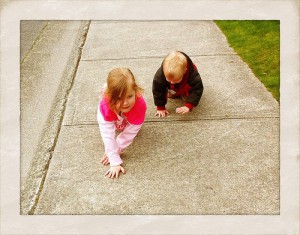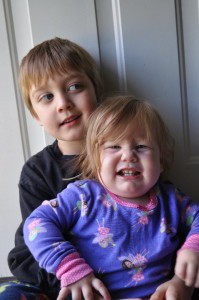I entered parenthood with a crib and an epidural. I had never heard of attachment parenting, and was pretty sure the family bed was something that could wreck a marriage.
As my baby turns one, and my husband and I celebrate our eighth year of marriage, we happily (and a bit nervously) went out for our first time alone as a couple since her birth, and reflected on the highlights of our year.
In addition to watching each other blossom as parents, the way we parent was at the top of both of our lists.
I never could have guessed that our style of parenting could be equally important to us as the event of becoming parents.
While hard to explain – or even justify – to the uninitiated, the steps we’ve taken to build a deep and secure bond with our daughter have transformed us as just much as they’ve helped to ground her. Specifically, our top seven favorite steps we’ve taken as parents this year:
- Bringing Dalia into our bed. Not only does she fall asleep faster, and sleep longer and more soundly, but the precious time we have as a family, gazing adoringly at our beautiful baby as she sleeps, or laughing together in the morning, is priceless.
- Breastfeeding! While it wasn’t clear if I’d be able to at all, and then whether I’d need to supplement forever, at around the two month mark – thanks to cosleeping, in fact – we were finally able to nurse exclusively. From that point on, it’s been invaluable to nurture Dalia both nutritionally and emotionally in my arms.
- Letting Dalia take the lead on her feedings. Introducing solids has been fun and fulfilling for the whole family, as we let go of our expectations of how a baby should eat, put safe “adult” foods in front of her, and let her show us how and what she wants to eat.
- Taking our infant to the potty! Reading up on Elimination Communication before Dalia’s birth, I skipped over all the yada yada about building a deep bond through pottying. Who are they fooling, I thought! But boy, knowing when she has to go and keeping our baby dry and happy are way more intimate experiences than we could have guessed.
- Tossing the disposables! While at first we were afraid of the work – and stigma – of cloth diapering, it’s incredibly gratifying to know we’ve reduced our landfill contributions to about one diaper per day. I’d like to go all the way, and am actively looking for a leak-free overnight cloth diaper, so any recommendations would be appreciated!
- Babywearing! How wonderful to be able to strap her in snugly under my winter coat and hit the road! Especially with a baby who hates the car and squeals when we take out the stroller, our beloved collection of carriers has increased our closeness and mobility. Beyond the practical benefits, the joys of “spoiling” our baby with all the in arms time we can give has been unmeasurable.
- Meeting like-minded parents! Since joining a group for AP moms, Dalia and I have met some amazing moms and babies who have paved the way for larger family friendships. Having a like-minded community of friends has helped us to bask in the wonder of parenthood and lean on a haven of supporters when questions or issues arise.
While each of these experiences has cracked us wide open for more and more love and closeness in a way we had not anticipated, the sum of the effect of our practices is worth way more than the individual parts. As we close the door on babyhood and enter toddlerhood together, I am confident in my ability to navigate our future as a mom. More importantly, my baby has confidence that she is loved, that her world is stable and secure, and that she can come back to us when she needs to recharge.
While AP isn’t for everyone, for those of us who know and love its practices, it can magnify – and multiply – the rewards of the parenting experience. I am grateful we happened upon this path, and I wouldn’t trade it for the world.





